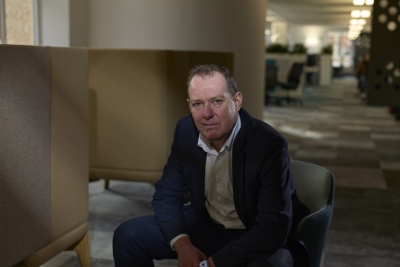14th May 2024
 At Skipton Business Finance our colleagues' wellbeing is extremely important. Looking after your mental, physical and financial wellbeing helps you thrive at work, encourage engagement and enhance performance. Mental Health affects how we think, feel, and behave with our colleagues and friends, it also helps determine how we handle stress and relate to others. It is important at every stage of our life.
At Skipton Business Finance our colleagues' wellbeing is extremely important. Looking after your mental, physical and financial wellbeing helps you thrive at work, encourage engagement and enhance performance. Mental Health affects how we think, feel, and behave with our colleagues and friends, it also helps determine how we handle stress and relate to others. It is important at every stage of our life.
We currently have 44 Mental Health First Aiders across the Society, which helps increase Mental Health interventions and create an environment where colleagues feel supported and more aware of the resources available. We had the pleasure to interview Matthew and Keith, two of our Mental Health First Aiders, they share how important it is to speak up in the workplace and common signs if you or one of your colleagues is struggling.
Q: How long have you been a Mental Health First Aider here at Skipton and why you decided to become one?
Matthew: 18 months. I’ve experienced events that have seen my mental health take a hit. I really benefited from the support of Society colleagues. Having low mental health gives you a new perspective and it made me want to help others.
Keith: Also 18 months and similarly, following the loss of my beloved sister. She was a Mental Health First Aider in the civil service, so I wanted to pass the baton on and try and understand my own wellbeing issues. I’m now the Mental Health First Aider Committee Chair.
Q: Why is it important to speak up about mental health especially in the workplace?
Matthew: Don’t keep things to yourself. Talk to someone, whether it’s a colleague, friend, family member or a Mental Health First Aider.
Keith: I’ve personally seen the benefit, from sharing and talking to people. If you bottle things up and don’t deal with them, it can be difficult to find a way out.
Q: What are some common signs to look out for if you’re struggling with mental health?
Matthew: I’d say it’s where you see people behaving differently to normal. For example, some people are naturally quiet. However, when an extrovert sociable person appears quiet and withdrawn, this may indicate that they are dealing with things.
Keith: When people are not thinking clearly. I’ve seen people being very emotional, unnaturally so. I’ve also become aware of increased dependency on alcohol. It’s key to be observant and notice any changes like this.
 Q: What type of support is there for mental health in the workplace?
Q: What type of support is there for mental health in the workplace?
Matthew & Keith: We’ve recently invested in our Mental Health First Aid network with 12 more colleagues trained, so we now have 40 Mental Health First Aiders across the Society to support you. Other support systems include:
• There’s a Mental Health First Aider committee including ourselves, Debra Beckett and Sarah Matischen, always available to help and support.
• As a Skipton colleague, we have access to the Unum Help@hand app and people often tell us how useful this is.
• And finally, there’s the Hub of Hope, an external resource endorsed by MHFA listing several organisations and resources that can help.
Q: What would you recommend someone does if they suspect that one of their colleagues is struggling with depression or Mental Health?
Matthew: Ask them how they are… and then ask them again. It’s accepted that people often reply “I’m fine” to the first time they’re asked (I know I did back in 2017) but they’re more likely to be honest if they’re asked again. I know there’s the worry of how the person will respond, especially if they’re struggling, but be brave, show interest and positive intent. Ask how they are in a conscientious way.
Keith: Reach out to one of us. It’s obviously totally confidential and non-judgmental. Whilst we’re are trained, we are not qualified, however we can point you in the direction of professional people who are.
Q: How has the role of Mental Health First Aider changed from its introduction until now?
Matthew and Keith: Whilst there’s so much more we can do; we’ve both felt encouraged to see colleagues being more open and willing to reach out when they need support. We won’t rest until everyone feels able to speak out, without worrying of any impact on their role or career. The most important thing is to get help and support if you need it.
Mental Health Awareness Week occurs annually with the aim to increase awareness of Mental Health issues with a focus on providing help and advice. If you would like to learn more about Mental Health and how important it is, please visit the Mental Health Foundation.










